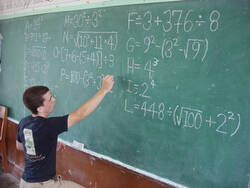When I was in grade- and high school, math was my arch-intimidator. I didn't enjoy it, and at some point I decided I wasn't a "math person." It felt like a game I couldn't master. In English and history and all the subjects that called for weighing and balancing and writing, I got it. It came naturally. But not math. Looking at a page of equations was like looking at a list of Saturday chores. Fun, alas, was on hold. The work would get done, but only because it had to.
A recent article in The Atlantic indicates I might have sold myself short. This isn't to say I had a little Will Hunting brewing in me, but a garden-variety Calculus student? Maybe. In "The Myth of 'I'm Bad at Math'," Miles Kimball and Noah Smith write:
The truth is, you probably are a math person, and by thinking otherwise, you are possibly hamstringing your own career. Worse, you may be helping to perpetuate a pernicious myth that is harming underprivileged children—the myth of inborn genetic math ability.
Is math ability genetic? Sure, to some degree. Terence Tao, UCLA’s famous virtuoso mathematician, publishes dozens of papers in top journals every year, and is sought out by researchers around the world to help with the hardest parts of their theories. Essentially none of us could ever be as good at math as Terence Tao, no matter how hard we tried or how well we were taught. But here’s the thing: We don’t have to! For high-school math, inborn talent is much less important than hard work, preparation, and self-confidence.
The authors impressively support their claim, pointing out books, studies and other data that show Americans are too quick to conclude we lack talent (I know, I know: we really do). Kimball and Smith, moreover, do not advance their arguments to boost self-esteems. For them, there is a lot riding on this self-misperception:
So why do we focus on math? For one thing, math skills are increasingly important for getting good jobs these days—so believing you can’t learn math is especially self-destructive. But we also believe that math is the area where America’s “fallacy of inborn ability” is the most entrenched. Math is the great mental bogeyman of an unconfident America. If we can convince you that anyone can learn math, it should be a short step to convincing you that you can learn just about anything, if you work hard enough.
You can read the rest of the article here. I'm off to do Geometry -- maybe.








